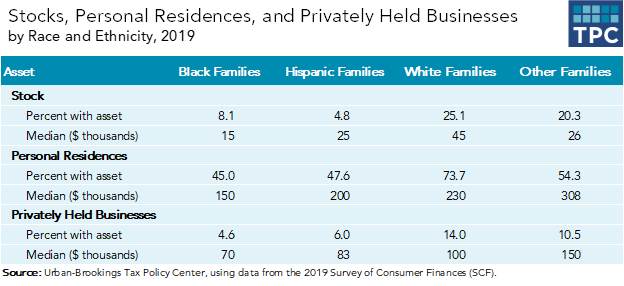[ad_1]
The Inner Income Code usually doesn’t consult with race or ethnicity, however federal earnings taxes might contribute to racial disparities when elements that have an effect on tax liabilities are associated with race. Traditionally, it has been tough to evaluate these results due to the absence of knowledge linking tax liabilities to race and ethnicity.
However utilizing the Tax Coverage Heart’s enhanced tax model overcomes that problem, shedding gentle on not simply the present results of longstanding insurance policies but in addition potential adjustments to the tax code.
In our new report, we discover that the present tax remedy of capital earnings favors White households over Black households for 3 key causes. First, sure kinds of capital earnings are successfully taxed at decrease charges than many different types of earnings, comparable to wages and salaries. Second, Black households on common have considerably much less wealth than White households and thus have fewer alternatives to make the most of these decrease charges and lots of different tax preferences. Third, even amongst these with related incomes and wealth, Black households are at an obstacle as a result of their asset portfolios are much less skewed towards tax-preferred property.

Some adjustments to the tax code—comparable to elevating the tax charges on capital beneficial properties—might slender racial discrepancies in households’ after-tax earnings. However the story is extra nuanced in relation to the tax remedy of households’ properties.
Tax remedy of capital earnings
In 2019, practically half of households’ gross property consisted of shares and private residences. Each property obtain preferential remedy below the tax code. Most dividends and long-term capital gains—the online proceeds from the gross sales of capital property held for longer than a 12 months—are taxed at decrease charges than many different sources of earnings, together with wages and curiosity. And, as much as a threshold, capital beneficial properties from the sale of personal residences are exempt from taxes. Taxpayers who itemize can even deduct their residence mortgage curiosity.
These tax preferences are most valuable to higher-income families, partially as a result of the dimensions of the tax breaks improve as households transfer into greater tax brackets.
Racial wealth hole
Black households, nonetheless, are much less probably than White households to profit from these tax preferences since they personal fewer property. In 2019, the median web wealth of White households was $189,100, versus $24,000 for Black households.
The racial wealth hole persists inside earnings teams. Within the middle-income quintile, the online wealth of White households averaged $345,100 in comparison with $130,200 for Black households in 2019. Even within the prime earnings quintile, the online wealth hole was vast, with common web wealth totaling $4.4 million for White households and $1.4 million for Black households.
Portfolio composition
Additionally hanging are variations within the composition of funding portfolios. Inventory holdings represented 4 % of gross asset worth for Black households, in comparison with over 13 % for White households in 2019. Inside every earnings quintile, the typical quantities of capital beneficial properties and dividends have been additionally greater for White households than for Black households.
The information on homeownership are extra ambiguous of their implications for the racial incidence of the mortgage curiosity deduction. About three-quarters of White households owned their properties versus lower than half of Black households in 2019. Total, White households have been additionally extra prone to have a mortgage than Black households. Each findings recommend that the mortgage curiosity deduction is extra helpful to White households than to Black households.
Nevertheless, the prevalence of mortgages amongst Black households within the highest earnings quintile—the place the tax advantages of the mortgage curiosity deduction would probably be biggest—is considerably greater than for White households (84 % and 71 %, respectively, in 2019). Black households within the prime earnings quintile have been additionally extra prone to make mortgage curiosity funds than White households.
Modifications to the tax remedy of funding earnings
Modifications to the tax code in 2019 might have helped mitigate the racial disparities attributable to the tax remedy of capital earnings, although the results could also be much less clear-cut than they could at first seem.
Elevating the tax charges on long-term web capital beneficial properties in 2019 would have disproportionately elevated taxes on White households. The relative burden on White households would have been better if the elevated capital beneficial properties charges utilized solely to higher-income taxpayers, whether or not that threshold was measured by being within the prime earnings tax bracket or by incomes extra some threshold, comparable to $1 million. Nevertheless, on the whole, taxpayers could possibly keep away from the tax improve by not realizing their capital beneficial properties.
Changing the house mortgage curiosity deduction with a 12 or 22 % nonrefundable tax credit score would have elevated the general progressivity of the person earnings tax. Within the first 4 quintiles of the earnings distribution, taxes would have fallen for all households. White households would have, on common, acquired a disproportionate share of the advantages. As a result of the worth of the tax credit score is lower than the worth of the deduction for higher-income households, the highest 5 % of the earnings distribution would have confronted tax will increase, on common.
However a disproportionate share of these tax hikes would have fallen on Black householders on this earnings group, on account of their better reliance on outdoors financing to buy a house. Different research suggests a cause for that outcome: Black households are much less prone to obtain inheritances or money help from relations than White households.
Our findings display how analyzing the tax code by means of the lens of race and ethnicity along with earnings can yield new insights on questions comparable to enhance equity and effectivity.
[ad_2]
Source link






















